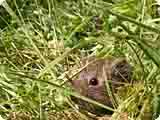séminaire du pôle évolution du vivant – vendredi 21 novembre 2008
The costs of parasitism by fleas in the common vole Microtus arvalis
Godefroy Devevey, University of Lausanne
vendredi 21 novembre 2008, à 11 heures, amphithéâtre Mariotte
The relationship between a parasite and its host is fundamentally marked by the costs for the host of the withdrawals of resources by the parasite. The depletion of resources results in alteration of host life-history traits and reduction of evolutionary success. Hosts have evolved a number of strategies to reduce these costs, either by fighting against the parasite directly or by reallocating resources to reduce costs on lifetime reproductive value. The effects of ectoparasites on burrowing mammals have been scarcely studied. In a first long-term experiment, we examined how fleas Nosopsyllus fasciatus affect physiological levels of the common vole, Microtus arvalis. We also examined whether fleas reduce longevity and if so, if it is due to investment in immune response or direct effects of parasitism. Secondly, we tested if a short-lasting juvenile parasitism can have long-term effects on phenotype, and if these effects could induce a predictive response to reduce damages when parasitized at the adult stage.
We found that parasitism by flea reduced subadult growth, induced anaemia and immunodepression, and increased energy consumption even when resting associated with splenomegaly. Moreover fleas reduce longevity, suggesting an overall reduction in fitness but it does not seem to be a cost of the permanent immune activation. Juvenile infestation by fleas delay development and has long-term effects on physiology. We found no evidence that juvenile parasitism primes voles to mount a predictive adaptive response in order to reduce effects of fleas on fitness components. On the contrary, neonatal parasitism seems to worsen the effect of adult parasitism. Overall, our results demonstrate the importance of fleas as a selective force in voles and suggest a role in the dynamic of rodent populations.
- kc_data:
- a:8:{i:0;s:0:"";s:4:"mode";s:0:"";s:3:"css";s:0:"";s:9:"max_width";s:0:"";s:7:"classes";s:0:"";s:9:"thumbnail";s:0:"";s:9:"collapsed";s:0:"";s:9:"optimized";s:0:"";}
- kc_raw_content:
The costs of parasitism by fleas in the common vole Microtus arvalis
Godefroy Devevey, University of Lausanne
vendredi 21 novembre 2008, à 11 heures, amphithéâtre Mariotte

The relationship between a parasite and its host is fundamentally marked by the costs for the host of the withdrawals of resources by the parasite. The depletion of resources results in alteration of host life-history traits and reduction of evolutionary success. Hosts have evolved a number of strategies to reduce these costs, either by fighting against the parasite directly or by reallocating resources to reduce costs on lifetime reproductive value. The effects of ectoparasites on burrowing mammals have been scarcely studied. In a first long-term experiment, we examined how fleas Nosopsyllus fasciatus affect physiological levels of the common vole, Microtus arvalis. We also examined whether fleas reduce longevity and if so, if it is due to investment in immune response or direct effects of parasitism. Secondly, we tested if a short-lasting juvenile parasitism can have long-term effects on phenotype, and if these effects could induce a predictive response to reduce damages when parasitized at the adult stage.
We found that parasitism by flea reduced subadult growth, induced anaemia and immunodepression, and increased energy consumption even when resting associated with splenomegaly. Moreover fleas reduce longevity, suggesting an overall reduction in fitness but it does not seem to be a cost of the permanent immune activation. Juvenile infestation by fleas delay development and has long-term effects on physiology. We found no evidence that juvenile parasitism primes voles to mount a predictive adaptive response in order to reduce effects of fleas on fitness components. On the contrary, neonatal parasitism seems to worsen the effect of adult parasitism. Overall, our results demonstrate the importance of fleas as a selective force in voles and suggest a role in the dynamic of rodent populations.
- extrait:
- lien_externe:
- titre:
- The costs of parasitism by fleas in the common vole Microtus arvalis
- intervenant:
- Godefroy Devevey
- date:
- vendredi 21 novembre 2008
